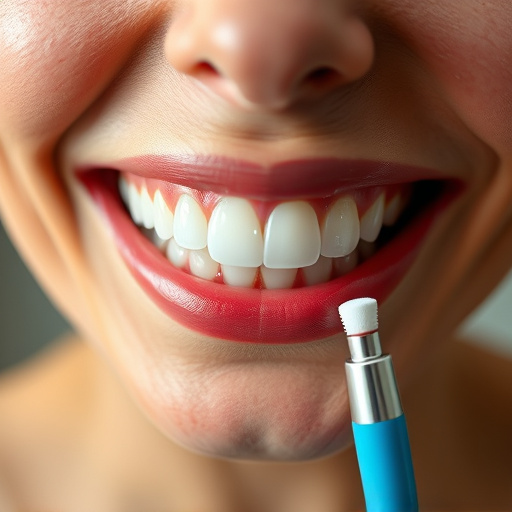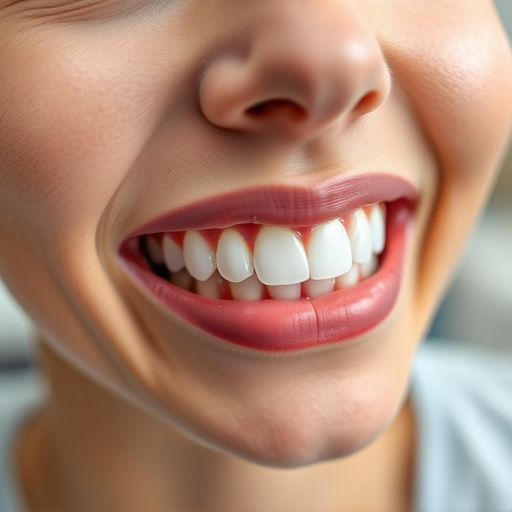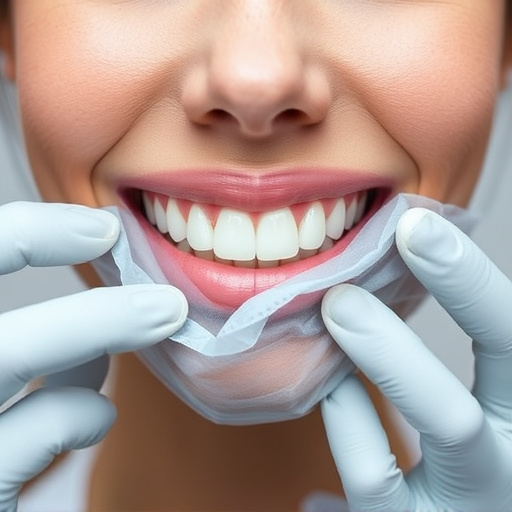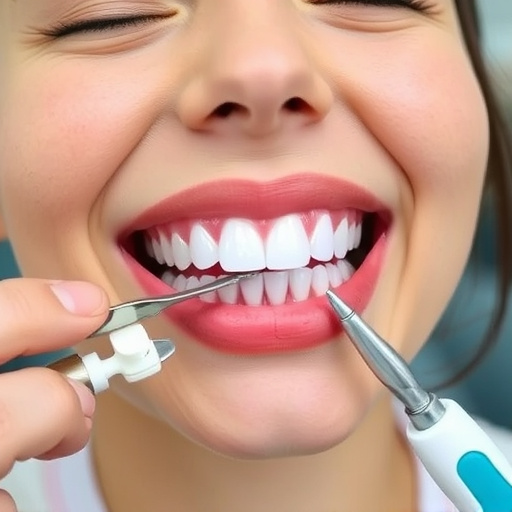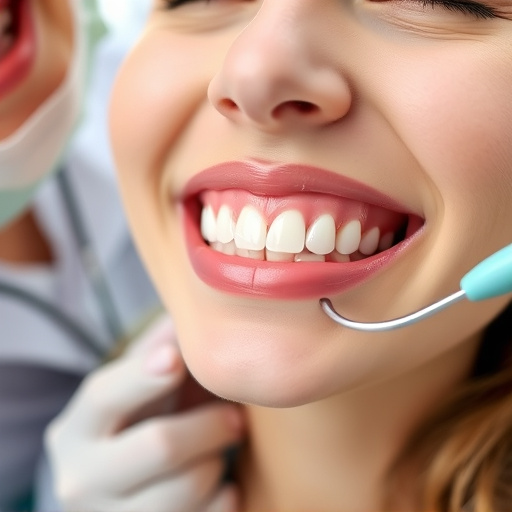Teeth grinding (bruxism) is a common condition driven by stress and anxiety, causing dental issues like enamel wear, gum recession, and headaches. Non-invasive treatments include behavioral therapy, custom mouthguards, dietary adjustments, and mindfulness practices to manage stress. Restorative dentistry, such as crowns, addresses physical symptoms, while holistic approaches offer long-term solutions. A comprehensive strategy combining these methods effectively treats teeth grinding, promoting both oral health and overall well-being.
Teeth grinding, or bruxism, is a common but often overlooked condition affecting millions. It can lead to significant dental damage and discomfort. This article explores effective treatments for teeth grinding, with a focus on non-invasive options and stress management techniques. Learn how to combat nighttime clenching, understand its causes and effects, and discover practical strategies to alleviate this disruptive habit. Find the best approach to teeth grinding treatment tailored to your needs.
- Understanding Teeth Grinding: Causes and Effects
- Non-Invasive Treatment Options for Tooth Grinding
- Stress Management Techniques to Combat Nighttime Clenching
Understanding Teeth Grinding: Causes and Effects
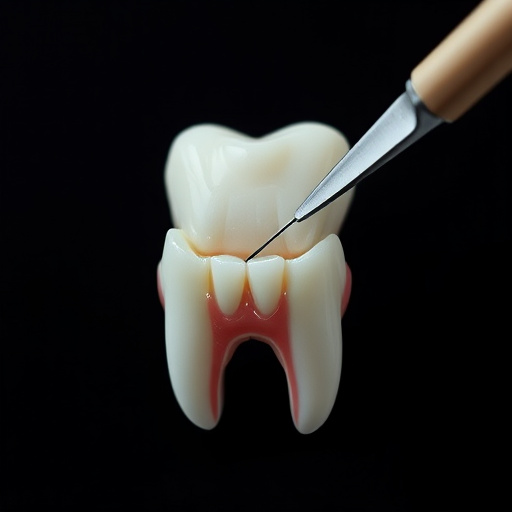
Teeth grinding, also known as bruxism, is a common condition that affects millions of people worldwide. It’s characterized by the repetitive and involuntary clenching or grinding of teeth, usually during sleep but sometimes throughout the day. While it might not seem like a serious issue, chronic teeth grinding can lead to significant dental problems. The primary cause of bruxism is often stress and anxiety, which can trigger muscle tension in the jaw and face. This, in turn, leads to excessive wear on tooth enamel, potentially causing chips, fractures, or even tooth loss over time.
The effects of teeth grinding extend beyond oral health. It can disrupt sleep patterns, leading to fatigue and daytime drowsiness. The grinding action also places significant pressure on the temporomandibular joint (TMJ), which connects the jawbone to the skull, potentially causing pain, inflammation, and even headaches. Additionally, long-term bruxism may contribute to dental issues like gum recession, tooth sensitivity, and severe dental erosion. Recognizing the causes and seeking appropriate teeth grinding treatment, often involving stress management techniques and sometimes dental interventions like dental crowns or regular teeth cleaning, can help mitigate these negative impacts.
Non-Invasive Treatment Options for Tooth Grinding
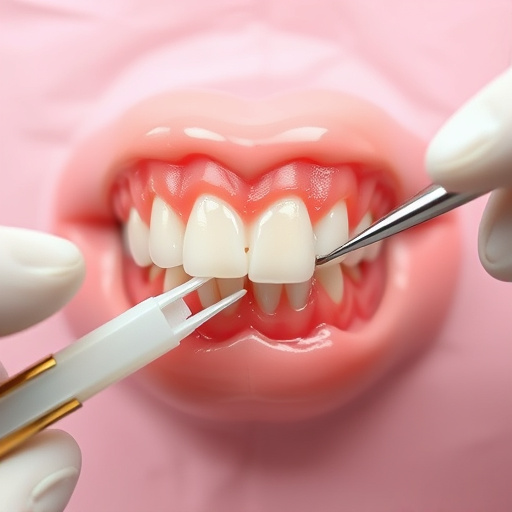
For those seeking non-invasive treatments for teeth grinding, there are several effective options available. One popular approach is behavioral therapy, which focuses on modifying habits and behaviors that contribute to the condition. This can include stress management techniques, such as relaxation exercises, meditation, or biofeedback, all of which aim to reduce tension in the jaw muscles. Additionally, mouthguards, specifically designed for teeth grinding, are another common treatment choice. These protective devices are worn during sleep to prevent damage to the teeth and gums caused by clenching and grinding.
Another alternative is dental appliances, like splints or night guards, which are custom-fitted devices that stabilize the jaw and protect the teeth from excessive wear. In some cases, adjusting one’s diet and incorporating more soothing foods can also help alleviate symptoms. Moreover, combining these non-invasive treatments with regular check-ups at a family dentistry or children’s dentistry practice can ensure ongoing monitoring and adjustments as needed. For those interested in cosmetic dentistry, it’s worth noting that proper teeth grinding treatment can also enhance overall oral health and aesthetics.
Stress Management Techniques to Combat Nighttime Clenching
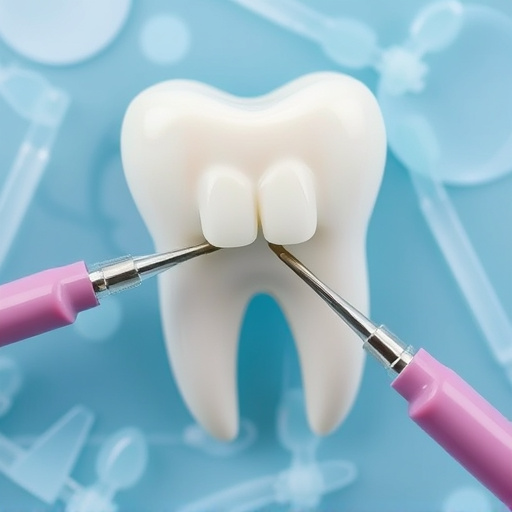
Stress management is a crucial component of teeth grinding treatment, particularly for nighttime clenching. Techniques like mindfulness meditation, deep breathing exercises, and yoga can help reduce stress levels throughout the day, potentially lessening the intensity and frequency of nocturnal grinding episodes. By addressing the root cause of stress, individuals can avoid resorting to jaw-clenching as a coping mechanism. Additionally, seeking professional support through therapy or counseling can provide valuable tools for managing stress in a healthy, lasting way.
Restorative dentistry offers solutions like dental crowns, which can be used to repair damaged teeth affected by long-term grinding. While these procedures address the physical symptoms, incorporating stress management techniques into one’s routine provides a holistic approach to teeth grinding treatment, addressing both the underlying cause and the tangible effects of this common disorder.
Teeth grinding, or bruxism, can significantly impact oral health and overall well-being. Fortunately, there are effective non-invasive treatment options available, alongside stress management techniques that can greatly alleviate this condition. By addressing the root causes, such as stress and anxiety, and implementing simple lifestyle changes, individuals can find relief from teeth grinding and improve their quality of life. Remember, seeking professional advice is crucial for a personalized teeth grinding treatment plan.








